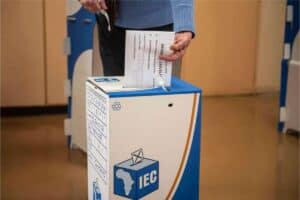IEC says it has implemented various measures to promote inclusivity and enable independent voting for individuals with disabilities such as dyslexia, deafness and visual impairments.

As election month approaches, it is important that all South Africans are offered a fair chance to be able to participate in the elections.
Previously, the voting process did not cater to people with disabilities like visual impairment and dyslexia.

LIVE interactive map, latest news, multimedia and more!
View MapHowever, times have changed the Electoral Commission of South Africa (IEC) has implemented various measures to promote inclusivity and enable independent voting for individuals with disabilities such as dyslexia, deafness and visual impairments.
Universal Ballot Template (UBT)
In the hope of ensuring accessibility and inclusivity for people with visual impairments the IEC has introduced a voting aid called the Universal Ballot Template (UBT) to assist persons with disabilities, specifically the partially sighted and blind, in casting their votes independently and maintaining the secrecy of their vote.
According to the electoral commission the UBT is a technology tool made available to aid individuals with visual impairments in casting their votes.
The UBT is a template that aligns with the ballot paper, allowing voters to easily identify and mark their preferred candidate or party.
ALSO READ: US says it’s up to SA and IEC to decide if observers are needed for elections
“When the ballot paper is inserted into the template, each window aligns to a particular candidate or party and the voter is free to make his or her secret and independent vote,” the IEC Spokesperson Kate Bapela explained.
Furthermore, Bapela said “the electoral commission has officials at the local sphere of the organisation who conduct voter education and registration within communities”.
This ensures that individuals with visual impairments have the necessary support and guidance to complete the registration process effectively.
According to Blind SA’s Lerato Jiyane, the UBT can be utilised by the visually-impaired, older people, those having dyslexia and those with low literacy.
READ MORE: WATCH: IEC says DA ‘misguided on how electoral process works’
“Blind SA also offers training to blind and partially sighted people on how to use the UBT before elections. In 2019, Blind SA registered as observers for the elections,” said Jiyane.
Trained IEC workers
The IEC said it recognises the importance of providing training and support to election officials to effectively serve voters with visual impairments.
“This includes people who are partially sighted and blind,” said Bapela.
“We even invite organisations representing the blind community such as BlindSA, South African National Council for the blind (Sancb), etc. to make presentations during our National training bootcamps,” she added.
NOW READ: US Embassy praises IEC’s ability to conduct free and fair elections
Sancb is a non-profit organisation (NPO) aimed at responfing to the needs of blind and partially sighted individuals.
According to their site they are mainly focused on “preventing blindness, facilitating community development, training, rehabilitation, education and assistive devices and technology”.
Engaging people with disabilities
To foster engagement and assurance that the correct information is relayed effectively to those who are deaf, blind and dyslexic the voting commission consistently communicates with the organisations representing this demographic.
“The organisations representing the blind are part of our key stakeholders with whom we hold regular briefing meetings to share ideas on how best we can serve people from the sector.
“During these meetings, election-related information is shared with the sector to distribute to their members,” said the spokesperson.
ALSO READ: IEC fires employee behind ANC, MK party candidates lists leak
They also change some of their voter education factsheets into braille; this is to ensure that information is readily accessible to individuals with visual impairments.
Furthermore, according to the commission there are also voter animation videos which have subtitles to cater to the deaf community, and voter education materials are converted into audio formats for the blind community.
Moreover, Bapela shared that they were “already in the process to converting some of the key voter education factsheets for NPE2024 into braille and these will be shared with the sector as per our plan with the organisations representing the sector”.
She said this was something done at every general election.
Partnerships with IEC
It is imperative that the IEC actively collaborates with organisations and advocacy groups representing people with disabilities to correctly serve their needs.
Some of the organisations the IEC collaborates with include BlindSA, Deafblind SA, SANCB, South African Blind Women in Action, and the National Association of the Blind and Partially Sighted Persons.
Bapela says they have been having meetings nationwide with the organisations representing the sector as part of the stakeholder briefing and preparations for NPE2024.
These meetings provide a platform for individuals with visual impairments to share their feedback, suggestions, and concerns.
MORE TO READ: Maimane says IEC signature policy puts new parties at a disadvantage






